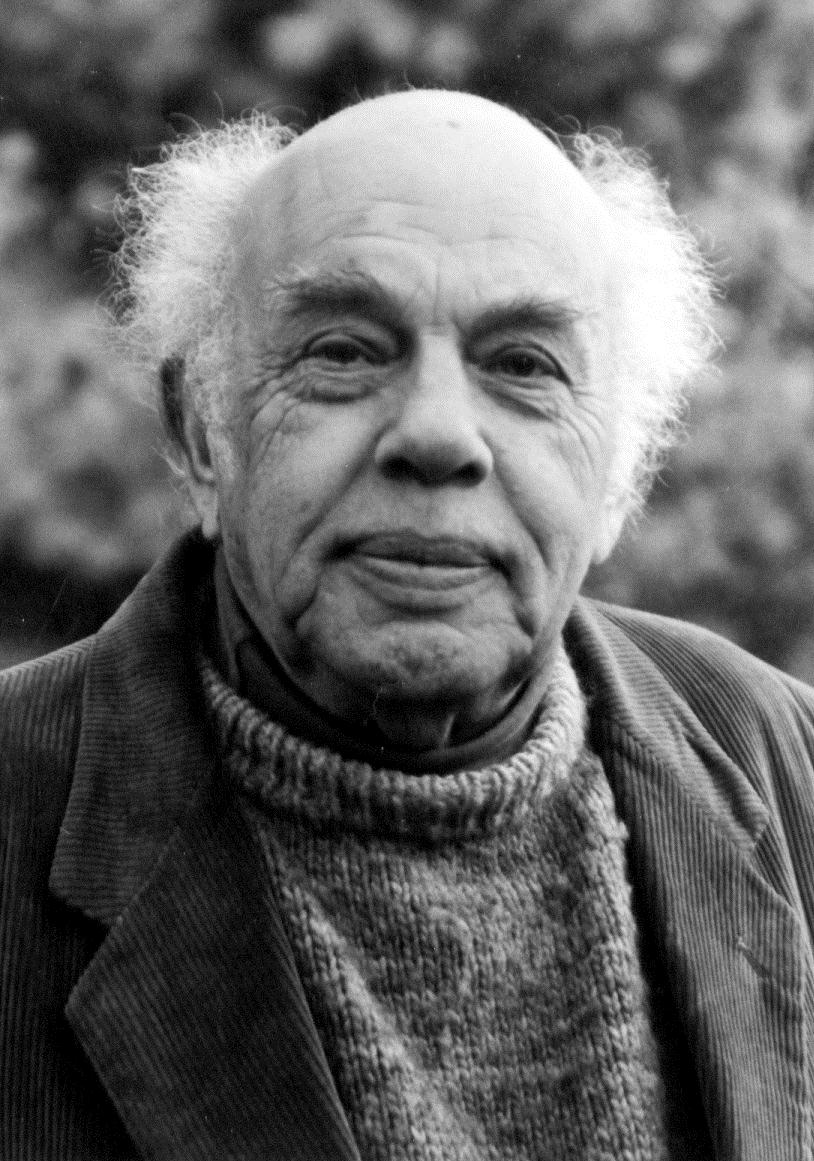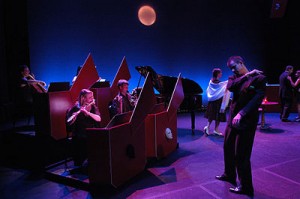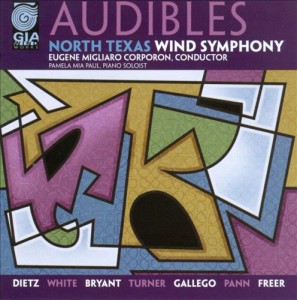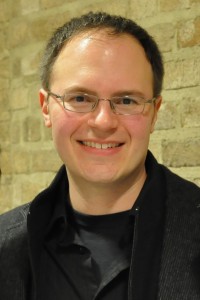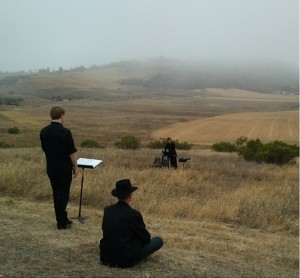 The 2013 Ojai Music Festival began this week under the artistic direction of choreographer Mark Morris. The festival will focus on American composers including Charles Ives, Henry Cowell, John Cage, Lou Harrison, John Luther Adams and Terry Riley. Two pieces – Strange and Sacred Noise as well as songbirdsongs by John Luther Adams – were scheduled for outdoor performance in rural venues.
The 2013 Ojai Music Festival began this week under the artistic direction of choreographer Mark Morris. The festival will focus on American composers including Charles Ives, Henry Cowell, John Cage, Lou Harrison, John Luther Adams and Terry Riley. Two pieces – Strange and Sacred Noise as well as songbirdsongs by John Luther Adams – were scheduled for outdoor performance in rural venues.
The first of these performances, Strange and Sacred Noise (1997) was sited on a knoll in Upper Ojai that is part of a local country school about 10 miles out of town. The 8:00 AM concert time found the musicians and about 150 listeners wrapped in an early morning mist. The percussion ensemble red fish blue fish had set up several stations around the top of the hill and the players and audience were free to move about as the piece progressed. Folks sat on blankets or brought a chair, but most stood and watched, moving as necessary to hear each section.
The beginning of the performance was announced by a sharp field drum roll and a series of characteristic rhythms that comprise …dust into dust…, the first section of Strange and Sacred Noise. The early morning stillness made for good listening in the open air, and a series of soft snare drum rolls that alternated in dynamics were clearly heard and very effective. Despite the unusual venue and informal atmosphere the audience was attentive; a series of pauses in this section would briefly restore the early morning quiet and this seemed to engage the listeners even more.
The second section, solitary and time-breaking waves, was played on a four tam-tams placed about 50 feet apart. A series of rolling crescendos rumbled through each register adding to the mystical atmosphere of the morning mist. The shimmering sense of waves and swift river currents invoked by this section reminded me of parts of Inuksuit, another JL Adams piece performed at Ojai last year. Inuksuit is on a much larger scale and was performed with several hundred in attendance outdoors at Libby Park and the audience reaction then was to watch and listen and to wander among the players while talking or calling on cell phones. For Strange and Sacred Noise, however, the audience was silent – as if in a concert hall. In both cases the audience reaction seemed appropriate and the staging of outdoor performances continues to be a good way to help people connect with new music.
The third section of Strange and Sacred Noise begins with a powerful roll of bass drums that vary in dynamics as higher register tom toms vary in tempo. Titled volocities crossing in phase-space this provides a muscular contrast to the previous section. The cross currents developed by the rhythmic interplay between the drum sets make for an interesting listen. The fourth section – triadic iteration lattices – consists of four differently pitched hand cranked air-raid sirens that are started at different time intervals. The sound of four sirens screaming out into the pastoral landscape was strikingly surreal, and the inclusion of these sounds in an outdoor percussion piece designated for a rural setting seems unusual. The rising and falling of four continuously changing pitches made for some unusual sonic combinations as this section progressed, however, and the fun of it is too much to resist.Sections 5 through 8 of this work are titled clusters on a quadrilateral grid and are performed on various marimbas, vibraphones and xylophones. The first part on marimbas is very quiet – a ten second pause by the players and then a switch of harmonies add to the mystery. The next part on xylophones is strident and dissonant and makes a fine contrast. After that a switch to bell-like registers form a lighter, faster texture and finally there is a return to the marimbas – a sort of da capo – completing section 8.
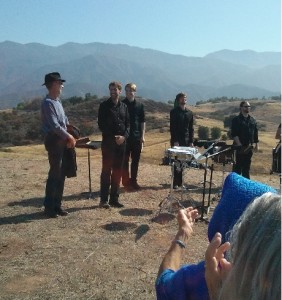 The ninth and last section of Strange and Sacred Noise – titled … and dust rising… – is a return to the original field drum set that opened the piece. By now the haze had burned off revealing the mountains that surround the knoll and the soft snare rolls and louder rhythms recalled the opening section but in a changed environment.
The ninth and last section of Strange and Sacred Noise – titled … and dust rising… – is a return to the original field drum set that opened the piece. By now the haze had burned off revealing the mountains that surround the knoll and the soft snare rolls and louder rhythms recalled the opening section but in a changed environment.
Strange and Sacred Noise is one of the earlier pieces by John Luther Adams that explore the sense of place and its connection to the environment. The little knoll in Upper Ojai was a fine venue and seemed well suited to the occasion.
Later that morning in the Libby Bowl Terry Riley’s In C was performed by 26 musicians including percussion by members of red fish blue fish. The sound system was in good form and those of us on the lawn could hear the precise rhythms and tight ensemble that was playing on the stage. To my ear there was a solid bass line and this gave the piece a sense of reserve and formality. But what it may have lacked in exuberance was more than offset by a consistently good reading as the piece progressed. Pronounced dynamic changes from time to time gave the texture some relief and the audience was for the most part engaged with a groove that was carefully sustained for the entire 65 minutes. At one point – about 36 minutes in – the combination of basses and voices was reminiscent of Wagner. At 49 minutes that same combination produced a definite sense of the majestic. Not what I expected but a very fine reading throughout.
This was a solid performance of In C and if recorded might make a good addition to the history of Terry Riley’s classic of minimalism. More information about the Ojai Music Festival can be found here.
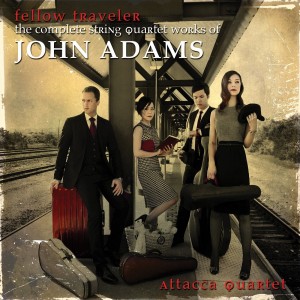
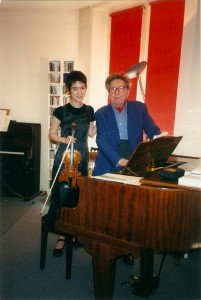 My visit to Henri Dutilleux was part of one of the most beautiful summers I’ve had. I stayed for several weeks in Paris just before beginning my doctoral degree. I was determined to pass out of the language-course requirement, so I rented a little apartment on the Rue du Cardinal-Lemoine and immersed myself in French, reading twenty pages a day, chatting with storepeople and watching French talk shows on TV. Besides exploring the city and making day trips to Chartres and Auvers-sur-Oise, I visited many museums, including the small ones (Bourdelle, Zadkine), and heard music at the Salle Pleyel (Krystian Zimerman), Cité de la Musique (Ensemble Intercontemporain in Carter, Kurtag and Dalbavie), Théâtre du Chatelet (Bluebeard’s Castle) and Bastille Opera (Renée Fleming in Manon). Meanwhile I practiced every day, and sometime in the middle of my stay, I called up Henri Dutilleux.
My visit to Henri Dutilleux was part of one of the most beautiful summers I’ve had. I stayed for several weeks in Paris just before beginning my doctoral degree. I was determined to pass out of the language-course requirement, so I rented a little apartment on the Rue du Cardinal-Lemoine and immersed myself in French, reading twenty pages a day, chatting with storepeople and watching French talk shows on TV. Besides exploring the city and making day trips to Chartres and Auvers-sur-Oise, I visited many museums, including the small ones (Bourdelle, Zadkine), and heard music at the Salle Pleyel (Krystian Zimerman), Cité de la Musique (Ensemble Intercontemporain in Carter, Kurtag and Dalbavie), Théâtre du Chatelet (Bluebeard’s Castle) and Bastille Opera (Renée Fleming in Manon). Meanwhile I practiced every day, and sometime in the middle of my stay, I called up Henri Dutilleux.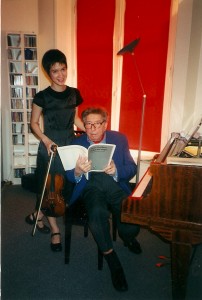
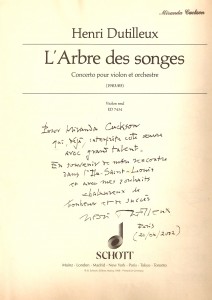 I recently saw Dutilleux’s short posthumous homage to Elliott Carter, in which he said that they did not meet much and that he had few specific memories besides of “a nice and strong character, a very charming man, and though we were far from each other – the Atlantic Ocean between us – I remain close to him and his music.” That June day was my only meeting with Dutilleux, but it was very meaningful for me to meet the creator of this music, and to play his substantial work under his curious and attentive gaze. He reminded me of certain great artists I’ve known, who share a simplicity and contentedness in their way of living that comes, I feel, from their satisfaction in their work and their love for what they do. Listening to recordings, I again relish his music’s generous ardor and stimulating clarity, luscious warmth, sweeping ebb and flow, big-band homophonic blocks of harmonies, and sense of spaciousness between the deep low register and the radiant highs. I respect his fastidiousness in composing but I dearly wish he had been more prolific in writing chamber and solo works that we could play and program. Having few pieces of his to play, I feel about his music much as I do about my meeting with him – truly delighted and wanting more chances to engage directly. He definitely left us wishing for more.
I recently saw Dutilleux’s short posthumous homage to Elliott Carter, in which he said that they did not meet much and that he had few specific memories besides of “a nice and strong character, a very charming man, and though we were far from each other – the Atlantic Ocean between us – I remain close to him and his music.” That June day was my only meeting with Dutilleux, but it was very meaningful for me to meet the creator of this music, and to play his substantial work under his curious and attentive gaze. He reminded me of certain great artists I’ve known, who share a simplicity and contentedness in their way of living that comes, I feel, from their satisfaction in their work and their love for what they do. Listening to recordings, I again relish his music’s generous ardor and stimulating clarity, luscious warmth, sweeping ebb and flow, big-band homophonic blocks of harmonies, and sense of spaciousness between the deep low register and the radiant highs. I respect his fastidiousness in composing but I dearly wish he had been more prolific in writing chamber and solo works that we could play and program. Having few pieces of his to play, I feel about his music much as I do about my meeting with him – truly delighted and wanting more chances to engage directly. He definitely left us wishing for more.